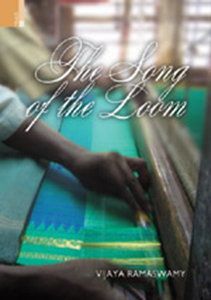
INFORMATION
- AUTHOR : Vijaya Ramaswamy
- ISBN : 978-93-80607-46-7
- Year : 2013
- Extent : 154 pp.
- Discount available on checkout
- Usually dispatched within 3 to 5 working days.
The Song of the Loom
| HB ₹ 795 . $ . ₤ |
PB ₹ . $ . ₤ |
|
| POD ₹ . $ . ₤ |
e-Book ₹ . $ . ₤ |
INFORMATION
- AUTHOR – Vijaya Ramaswamy
- ISBN – 978-93-80607-46-7
- Year – 2012
- Extent: 400 + 40 coloured illustrations
- 10% discount + free shipping
- Usually dispatched within 3 to 5 working days.
The Song of the Loom tells the story of the hoary tradition of textile weaving in southern India from the perspective of the weavers. It is, hence a narrative from below, mediated through the author’s interaction with weaving communities for over two decades. The author stayed with weavers, participated in their cultural and religious festivals and listened to their many songs, which related to all facets of their lives—their struggles on the loom, their despair with the younger generation which is forsaking a traditional way of life and their desperate clinging to their traditions and their memories.
This book, however, goes beyond a retelling of folk narratives and the recording of loom songs. It is also about the nitty-gritty of the survival of a leisurely craft which is struggling to stay afloat at a time when speed driven technology is the prime mover in the major commercial domain of textiles and saleability and competitive pricing become the decisive factors. The book therefore has chapters on culturally embedded traditional designs, traditional technology versus advancing technology mediated by the notion of ‘appropriate’ technology. The author has endeavoured to connect the concerns of the weavers with the role of NGOs and government established weaver service centres. This book should therefore provide a valuable feedback to the votaries of the handloom industry.
The Author
Vijaya Ramaswamy is Professor at the Centre for Historical Studies, Jawaharlal Nehru University, New Delhi, and teaches economic history and history of religion in ancient India.
The Song of the Loom tells the story of the hoary tradition of textile weaving in southern India from the perspective of the weavers. It is, hence a narrative from below, mediated through the author’s interaction with weaving communities for over two decades. The author stayed with weavers, participated in their cultural and religious festivals and listened to their many songs, which related to all facets of their lives—their struggles on the loom, their despair with the younger generation which is forsaking a traditional way of life and their desperate clinging to their traditions and their memories.
This book, however, goes beyond a retelling of folk narratives and the recording of loom songs. It is also about the nitty-gritty of the survival of a leisurely craft which is struggling to stay afloat at a time when speed driven technology is the prime mover in the major commercial domain of textiles and saleability and competitive pricing become the decisive factors. The book therefore has chapters on culturally embedded traditional designs, traditional technology versus advancing technology mediated by the notion of ‘appropriate’ technology. The author has endeavoured to connect the concerns of the weavers with the role of NGOs and government established weaver service centres. This book should therefore provide a valuable feedback to the votaries of the handloom industry.
The Author
Vijaya Ramaswamy is Professor at the Centre for Historical Studies, Jawaharlal Nehru University, New Delhi, and teaches economic history and history of religion in ancient India.
Table Of Contents
| List Of Illustrations | ix-x |
| Preface | xi-xiii |
| Acknowledgements | xv |
| Introduction: Gathering The Threads | xvii-xx |
| Editorial Method | xxi |
| 1. Oral Traditions As Alternative Histories: The Need To Map Community Memories | 1-8 |
| 2. Situating Handloom Weaving And Weaver Community Traditions | 9-18 |
| 3. The Traditional Weaving Castes Of South India And The New Entrants | 19-27 |
| 4. Origin Myths Among The Weaver Castes | 28-41 |
| 5. Technological Traditions In The Weaving Industry | 42-65 |
| 6. Many Splendoured Weaves: Weaving Traditions | 66-79 |
| 7. From Temples To The Temporal: Weaver Design Traditions | 80-91 |
| 8. Weaver Social Traditions | 92-110 |
| Concluding Strands | 111-112 |
| Appendices | 113-117 |
| Select Bibliography | 119-126 |
| Index | 127-131 |





